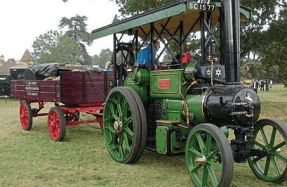A-Z OF STEAM VEHICLES
If he has missed some out please do supply us with information.
ARMITAGE & RUSTON
SC Armitage began repairing agricultural machinery in Chatteris, Cambridgeshire around 1870. Portable steam engines were soon produced and he was joined by Frank Ruston, nephew of Joseph Ruston, of steam fame in Lincoln.
Following portable engines from the mid-1870s, a small number of traction engines are believed to have been built, but probably nothing after 1896 when the partnership was dissolved and the firm became Chatteris (and later Fairleede) Engineering.
ARMSTRONG-WHITWORTH
Established in the nineteenth century as armaments, steel, electrical and hydraulic engineers, the firms owned by Armstrong (1810-1900) and Whitworth (born 1803 and famous for the eponymous screw thread) were fully integrated in 1897. Internal combustion-engined cars and commercials were added in 1906. Great War production included tanks, armaments, aircraft and ships and the workforce on the Tyne and at the Openshaw, Manchester steel and machine tool works stood at 78,000. Looking for peace-time manufacturing opportunities, Siddeley Deasy was acquired to create the Armstrong Siddeley vehicle and aircraft business and a
You’re reading a preview, subscribe to read more.
Start your free 30 days

